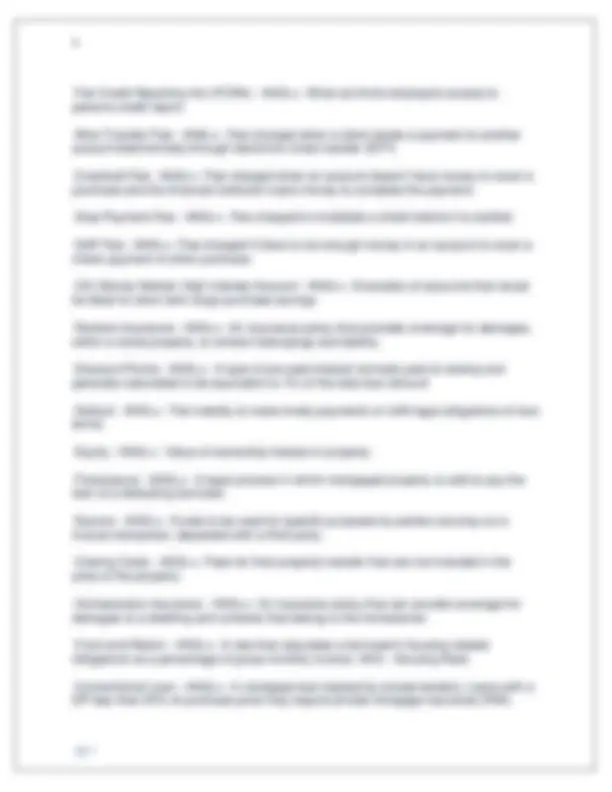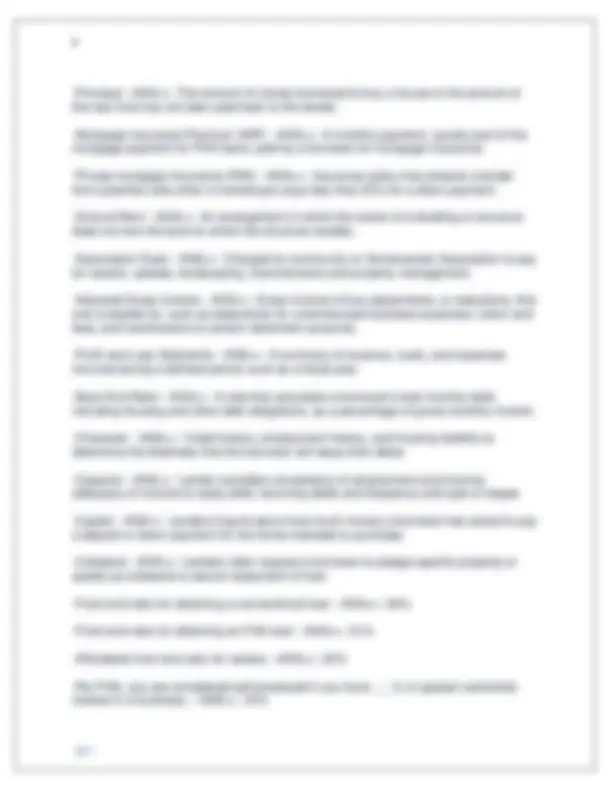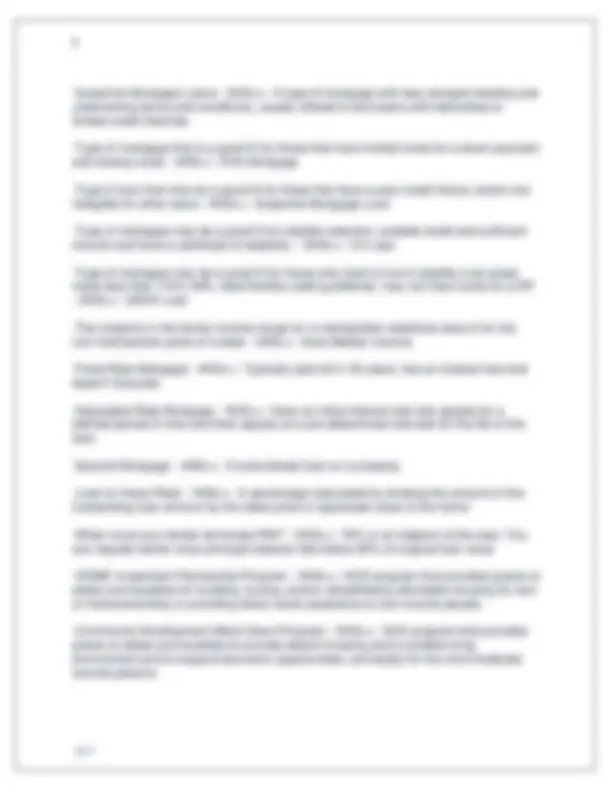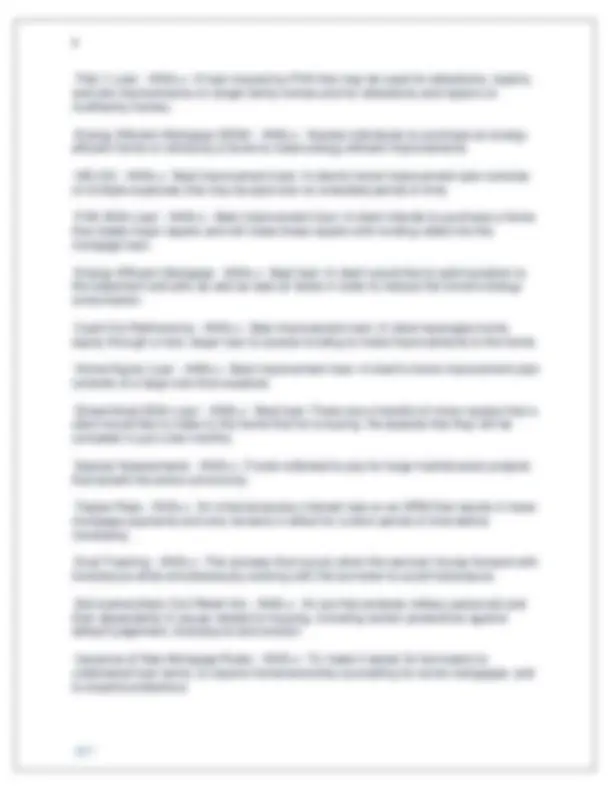







Study with the several resources on Docsity

Earn points by helping other students or get them with a premium plan


Prepare for your exams
Study with the several resources on Docsity

Earn points to download
Earn points by helping other students or get them with a premium plan
Community
Ask the community for help and clear up your study doubts
Discover the best universities in your country according to Docsity users
Free resources
Download our free guides on studying techniques, anxiety management strategies, and thesis advice from Docsity tutors
Answers to various questions related to the fair housing act and mortgage lending. Topics include deed restrictions, redlining, reasonable modification, marketing analysis, credit scoring, equity, and various types of mortgages. It also covers programs and acts designed to assist homeowners and renters.
Typology: Exams
1 / 9

This page cannot be seen from the preview
Don't miss anything!






Deed Restrictions - ANS>> Legally enforceable terms that govern the use of real estate Redlining - ANS>> The practice of refusing to make residential loans or imposing more onerous terms on any loans made because of the predominant race, color, national origin, religion, sex, disability, or familial status of the area's residents. Civil Rights Act of 1968 - ANS>> Following the assassination of Dr. Martin Luther King Jr., Congress passed what monumental piece of legislation, which prohibits discrimination in housing sales, rentals, and financing based on race, color, national origin, religion, sex, disability and familial status? 7 - ANS>> The Fair Housing Act, as amended, protects how many characteristics? Reasonable Modification - ANS>> A property manager of an apartment complex that receives federal financial assistance installs a ramp so that a tenant in a wheelchair can easily access her first-floor apartment. Reasonable Accommodation - ANS>> Housing provider has a policy of requiring tenants to come to the rental office to pay their rent. A tenant with a mental disability, who is afraid to leave her unit, is allowed to mail her rent payment. True - ANS>> The Fair Housing Act does not prohibit a lender from showing potential clients information about different loans. Fair Housing Assistance Program (FHAP) - ANS>> Provides annual funding to state and local agencies that enforce fair housing laws that are substantially equivalent to the Fair Housing Act. These funds go towards an agency's capacity building, administrative costs, investigative and enforcement efforts, training and other projects designed to support enforcement of fair housing law. Fair Housing Initiatives Program (FHIP) - ANS>> Provides funding to fair housing organizations and nonprofits that assist people who may have been victims of housing discrimination. Marketing Analysis - ANS>> Aim is to identify groups of people who would benefit most if targeted by the campaign, the characteristics of these people, and their expectations. Networking Event - ANS>> The opportunity to increase awareness of the plans and actions of housing industry members, private organizations and foundations, public housing agencies, neighborhood groups, regional organizations, and others to further fair housing objectives.
Personal Information - ANS>> The section of the credit report that contains employer details. Account Information - ANS>> The section of a credit report that contains information about a student loan. Public Records - ANS>> The section of the credit report that contains court information such as a bankruptcy. Inquiries - ANS>> The section of the credit report that will show recent attempts to open a credit card. Consumer Rights - ANS>> The section of the credit report that contains information about how to correct inaccuracies. Account History - ANS>> Credit: Payment history of accounts, including late payments, delinquencies, judgments, and liens. Amounts Owed - ANS>> Credit: Ratio of total credit extended to the amount of credit owed. Length of Credit History - ANS>> Credit: Overall length of credit history in the report as well as the average age of accounts. Types of Credit - ANS>> Credit: Variety of accounts (e.g. credit card, auto loan, mortgage) New Credit - ANS>> Credit: Number of recent credit inquiries, as well as new credit accounts. AnnualCreditReport.com - ANS>> Where does a client go to get a free credit report? Fair Credit Reporting Act (FCRA) - ANS>> You have the right to dispute information in your credit file that is incomplete, inaccurate, or unverifiable. Fair and Accurate Credit Transactions Act (FACTA) - ANS>> You have the right to a free annual credit report. Fair and Accurate Credit Transactions Act (FACTA) - ANS>> You have the right to place a fraud alert on your credit file. Fair Credit Reporting Act (FCRA) - ANS>> You have the right to know what is in your credit file. Fair Credit Billing Act (FCBA) - ANS>> Which federal law protects a consumer's right to dispute a billing error associated with his/her credit card account.
Principal - ANS>> The amount of money borrowed to buy a house or the amount of the loan that has not been paid back to the lender. Mortgage Insurance Premium (MIP) - ANS>> A monthly payment, usually part of the mortgage payment for FHA loans, paid by a borrower for mortgage insurance. Private mortgage Insurance (PMI) - ANS>> Insurance policy that protects a lender from potential risks when a homebuyer pays less than 20% for a down payment. Ground Rent - ANS>> An arrangement in which the owner of a dwelling or structure does not own the land on which the structure resides. Association Dues - ANS>> Charged by community or Homeowners Association to pay for repairs, upkeep, landscaping, improvements and property management. Adjusted Gross Income - ANS>> Gross income minus adjustments, or reductions, that one is eligible for, such as deductions for unreimbursed business expenses, tuition and fees, and contributions to certain retirement accounts. Profit and Loss Statments - ANS>> A summary of revenue, costs, and expenses incurred during a defined period, such as a fiscal year. Back-End Ratio - ANS>> A rate that calculates a borrower's total monthly debt, including housing and other debt obligations, as a percentage of gross monthly income. Character - ANS>> Credit history, employment history, and housing stability to determine the likeliness that the borrower will repay their debts Capacity - ANS>> Lender considers consistency of employment and income, adequacy of income to repay debt, recurring debts and frequency and type of wages Capital - ANS>> Lenders inquire about how much money a borrower has saved to pay a deposit or down payment for the home intended to purchase. Collateral - ANS>> Lenders often request a borrower to pledge specific property or assets as collateral to secure repayment of loan. Front-end ratio for obtaining a conventional loan - ANS>> 28% Front-end ratio for obtaining an FHA loan - ANS>> 31% Affordable front-end ratio for renters - ANS>> 30% Per FHA, you are considered self-employed if you have ___% or greater ownership interest in a business. - ANS>> 25%
Subprime Mortgage Loans - ANS>> A type of mortgage with less stringent lending and underwriting terms and conditions, usually offered to borrowers with blemished or limited credit histories. Type of mortgage that is a good fit for those that have limited funds for a down payment and closing costs - ANS>> FHA Mortgage Type of loan that may be a good fit for those that have a poor credit history and/or are ineligible for other loans - ANS>> Subprime Mortgage Loan Type of mortgage may be a good fit for eligible veterans, suitable credit and sufficient income and have a certificate of eligibility. - ANS>> VA Loan Type of mortgage may be a good fit for those who want to live in eligible rural areas, make less than 115% AMI, need flexible credit guidelines, may not have funds for a DP
Know Before you Owe (TRID) - ANS>> requires easier to use mortgage disclosure forms that clearly outline the terms of the mortgage to the borrower and provide detailed explanations about how form should be completed and used. The Know Before you Owe rule combined the Good Faith Estimate and the Truth in Lending disclosure and became what document? - ANS>> Loan Estimate The Know Before you Owe rule combined the HUD-1 and the final TIL disclosure became what document? - ANS>> Closing Disclosure Loan Estimate - ANS>> Designed to help consumers understand the key features, costs, and risks of the mortgage loan for which they are applying, must be provided to consumers no later than three business days after they submit a loan application Closing Disclosure - ANS>> Designed to help consumers understand all of the costs of the transaction, must be provided to consumers at least three business days before closing. Home Ownership and Equity Protections Act (HOEPA) - ANS>> Federal law enforcing special disclosure requirements and restrictions on terms for loans that meet high-cost mortgage tests. What is the biggest factor in determining the cost of your insurance? - ANS>> Location of your home What item is critical to consider when working with a client to prepare a household system maintenance plan? - ANS>> Target Replacement Date When preparing a emergency preparedness plan, where is the best location for meeting point? - ANS>> A location outside of the neighborhood, preferably a place where your family can live temporarily. Home Equity Loan - ANS>> Provides a lump sum of money for home improvements - often referred to as a second mortgage Home Equity Line of Credit (HELOC) - ANS>> A line of credit from which you can borrow at any time during the draw period, up to your credit limit. FHA 203k Loan - ANS>> A loan insured by FHA to provide you with an initial loan for purchasing a home as well as funding for home improvement. Streamline 203k Loan - ANS>> Permits homebuyers and homeowners to finance up to $35K into their mortgage to repair, improve, or upgrade their home.
Title 1 Loan - ANS>> A loan insured by FHA that may be used for alterations, repairs, and site improvements on single family homes and for alterations and repairs on multifamily homes. Energy Efficient Mortgage (EEM) - ANS>> Assists individuals to purchase an energy efficient home or refinance a home to make energy efficient improvements HELOC - ANS>> Best Improvement loan: A client's home improvement plan consists of multiple expenses that may be paid over an extended period of time. FHA 203k Loan - ANS>> Best improvement loan: A client intends to purchase a home that needs major repairs and will make those repairs with funding rolled into the mortgage loan. Energy Efficient Mortgage - ANS>> Best loan: A client would like to add insulation to the basement and attic as well as seal air leaks in order to reduce the home's energy consumption. Cash-Out Refinancing - ANS>> Best Improvement loan: A client leverages home equity through a new, larger loan to access funding to make improvements to the home Home Equity Loan - ANS>> Best Improvement loan: A client's home improvement plan consists of a large one-time expense. Streamlined 203k Loan - ANS>> Best loan: There are a handful of minor repairs that a client would like to make to the home that he is buying. He expects that they will be complete in just a few months. Special Assessments - ANS>> Funds collected to pay for large maintenance projects that benefit the entire community. Teaser Rate - ANS>> An initial temporary interest rate on an ARM that results in lower mortgage payments and only remains in effect for a short period of time before increasing. Dual Tracking - ANS>> The process that occurs when the servicer moves forward with foreclosure while simultaneously working with the borrower to avoid foreclosure. Servicemembers Civil Relief Act - ANS>> An act that protects military personnel and their dependents in issues related to housing, including certain protections against default judgement, foreclosure and eviction Issuance of New Mortgage Rules - ANS>> To make it easier for borrowers to understand loan terms, to require homeownership counseling for some mortgages, and to expand protections